
After enrolling at a small-town North Florida charter school, Micah Cook began to excel in writing competitions. He wanted to sign up for a class where he could hone his skills. There were no journalism classes at his school, but he could sign up for one anyway.
“I’m liking it now,” the ninth-grader said during an interview last semester. “I’m doing a story on how having a career in high school affects your stress and grades.”
His journalism class was one of two dozen now taken by students at Belmont Academy in Lake City, Fla., which are taught by virtual teachers, but held in a computer lab on the school’s campus. The school is home to one of what are now more than 225 school-based labs powered by Florida Virtual School.
Students have been signing up for online classes for nearly two decades in a state that’s home to the largest standalone public virtual school in the country and a growing number of private competitors.
Increasingly, though, the state’s virtual school isn’t just offering virtual courses and district franchises that are separate from physical schools. It’s also providing teachers and curriculum for Virtual Learning Labs, like the one at Belmont, or Blended Learning Communities, a similar concept with more in-person contact by teachers. Under the concept, which debuted in 2010, FLVS provides the teachers and the curriculum. But students spend take their time with an in-person facilitator who helps guide them through their work.
At any time, there could be a dozen or so students working in the lab, working on different lessons or collaborating in small groups.
Ron Barker, an assistant principal at Belmont, said the virtual lab allows the charter school to offer subjects for which it could never afford to hire a full-time teacher. Some, like a health and personal fitness class known as HOPE, are state graduation requirements that fall outside the core academic subjects. Others, like journalism and web design, are electives.
“Something that it wouldn’t make sense to offer, we can now offer,” he said. “I’m able to offer that class because I have Florida Virtual backing me up.”
Of the more than 225 schools with in-person FLVS labs, nearly two-thirds are private, according to spokeswoman Tania Clow, while 22 percent are district schools, 12 percent are charters, and 2 percent cater to home-school families.
DeAnne Watson, an FLVS district relations manager who works with schools in North-Central Florida, said the model appeals to schools that want to broaden their course offerings, and also to schools that focus on sports or the arts, where students have unconventional schedules that devote hours to training or rehearsals.
The schools split the funding with the virtual school and hire the facilitators, who help keep students on track in ways that wouldn’t be possible if they simply took virtual courses on their own.
“It’s very appealing to schools to have this model, because they get the extra layers of support,” Watson said.


